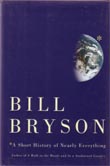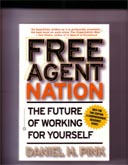(Click on a book or book title for purchasing information or more reviews)
Diane G. Oblinger and James L. Oblinger, Editors
How do today’s students differ from those of earlier generations? Diane and James Oblinger provide a detailed description of the activities and life styles of college students today, especially regarding their understanding and uses of technology.– Editors’ statement
The book is available in PDF.
Free Agent Nation By Daniel Pink
Reviews for Free Agent Nation
“Helps open the way for a national dialogue about the future meaning of career and community.” — Orange County Register
“The most important business book you will read this year.”
— Washington Business Journal
“Excellent . . .Pink Astutely summarizes what this shift in employment means to millions of Americans . . . Highly recommended.” — Library Journal
 A Brief History of Nearly Everything By Bill Bryson
A Brief History of Nearly Everything By Bill Bryson
Editorial Reviews
Amazon.com
From primordial nothingness to this very moment, A Short History of Nearly Everything reports what happened and how humans figured it out. To accomplish this daunting literary task, Bill Bryson uses hundreds of sources, from popular science books to interviews with luminaries in various fields. His aim is to help people like him, who rejected stale school textbooks and dry explanations, to appreciate how we have used science to understand the smallest particles and the unimaginably vast expanses of space. With his distinctive prose style and wit, Bryson succeeds admirably. Though A Short History clocks in at a daunting 500-plus pages and covers the same material as every science book before it, it reads something like a particularly detailed novel (albeit without a plot). Each longish chapter is devoted to a topic like the age of our planet or how cells work, and these chapters are grouped into larger sections such as “The Size of the Earth” and “Life Itself.” Bryson chats with experts like Richard Fortey (author of Life and Trilobite) and these interviews are charming. But it’s when Bryson dives into some of science’s best and most embarrassing fights–Cope vs. Marsh, Conway Morris vs. Gould–that he finds literary gold. –Therese Littleton–This text refers to the Hardcover edition.
A Brief History of the Twenty-First Century By Thomas Friedman
Editorial Reviews from Amazon.com
Thomas L. Friedman is not so much a futurist, which he is sometimes called, as a presentist. His aim, in his new book, The World Is Flat, as in his earlier, influential Lexus and the Olive Tree, is not to give you a speculative preview of the wonders that are sure to come in your lifetime, but rather to get you caught up on the wonders that are already here. The world isn’t going to be flat, it is flat, which gives Friedman’s breathless narrative much of its urgency, and which also saves it from the Epcot-style polyester sheen that futurists–the optimistic ones at least–are inevitably prey to.
What Friedman means by “flat” is “connected”: the lowering of trade and political barriers and the exponential technical advances of the digital revolution have made it possible to do business, or almost anything else, instantaneously with billions of other people across the planet. This in itself should not be news to anyone. But the news that Friedman has to deliver is that just when we stopped paying attention to these developments–when the dot-com bust turned interest away from the business and technology pages and when 9/11 and the Iraq War turned all eyes toward the Middle East–is when they actually began to accelerate. Globalization 3.0, as he calls it, is driven not by major corporations or giant trade organizations like the World Bank, but by individuals: desktop freelancers and innovative startups all over the world (but especially in India and China) who can compete–and win–not just for low-wage manufacturing and information labor but, increasingly, for the highest-end research and design work as well. (He doesn’t forget the “mutant supply chains” like Al-Qaeda that let the small act big in more destructive ways.) Friedman tells his eye-opening story with the catchy slogans and globe-hopping anecdotes that readers of his earlier books and his New York Times columns will know well, and also with a stern sort of optimism. He wants to tell you how exciting this new world is, but he also wants you to know you’re going to be trampled if you don’t keep up with it. His book is an excellent place to begin. –Tom Nissley
Where Were You When the World Went Flat?

 Educating the Net Generation
Educating the Net Generation
 The World Is Flat
The World Is Flat